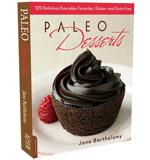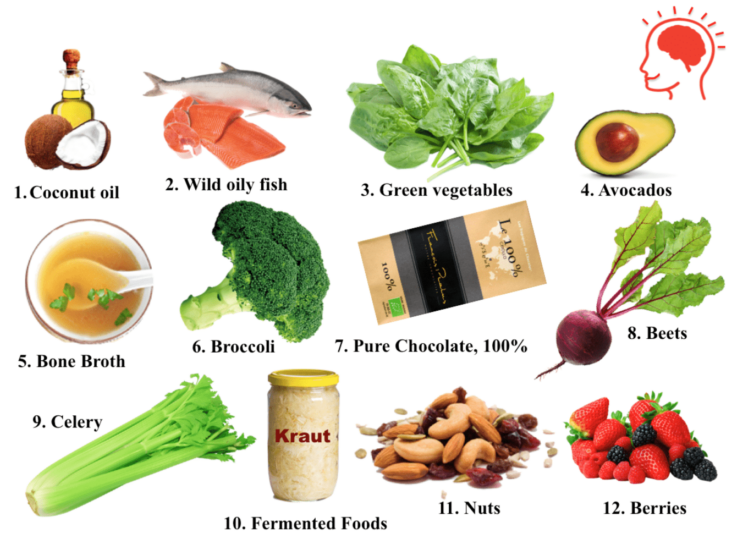These top 12 Brain Foods are super-nourishing for your mind and body. Even better, they taste DELICIOUS! Here are my top 12 Brain Foods: Coconut oil, Wild oily fish, Green leafy vegetables, Avocados, Bone Broth, Broccoli and Cruciferous veggies, 100% Chocolate (no sugar!), Beets, Celery, Fermented foods, Nuts, and Berries! Enjoy these top “superfoods” often to improve your brain function for the rest of your life! ESPECIALLY Coconut Oil. Here we go with number one!
- Coconut Oil
has healthy MCT oils (medium chain triglycerides). THIS is my top pick for brain fuel because it has an immediate effect on the brain. The body and brain can metabolize two types of fuel for energy – either carbohydrates or fats. Although the brain can use either one, studies suggest that metabolism of fats can help promote brain health, far better than carbohydrates. Why is that? MCT’s are digested much like carbohydrates. They enter your bloodstream more quickly, but without the release of insulin and its effect on your liver, as in the case of carbs. In addition, the anti-inflammatory properties of coconut oil may play a role in preventing dementia. What are the best sources of MCT oils? Coconut oil is the richest source, followed by palm kernel oil (not sold in the USA) and grass-fed, organic dairy products. Organic goat milk and fermented goat products are excellent sources of MCT’s. - Wild Oily Fish, such as Sardines and Salmon is #2.
Oily fish is one of the best sources of omega 3 essential fatty acids. This is important for brain health because wild oily fish is rich in Omega 3, which contains DHA and EPA, necessary for proper brain function. A Tufts University study of 900 elderly people found that those persons with higher DHA levels had a 47 % lower risk of memory loss, dementia and Alzheimer’s disease. Wild salmon, herring and sardines are good options in this category. “Omega-3 fatty acids contain DHA and EPA, which are highly concentrated in the brain and are crucial for optimal brain function,” says Joy Dubost, PhD, RD, a dietitian and spokesperson for the Academy of Nutrition and Dietetics. Fatty fish are also a great source of vitamin D, says Dubost, and numerous studies indicate vitamin D can help protect the brain.
Warning: Much of the wild fish in the ocean is contaminated with mercury and other toxins. Wild fish are also being over-fished to the point of extinction, which means we must eat responsibly if we want them to stick around. The best choices are smaller wild fish as they reproduce more quickly and have lower concentrations of poisons. The healthiest seafood includes wild salmon, sardines, anchovies, and herring. To minimize your toxic intake, avoid larger fish such as tuna, swordfish, bluefish, cod, halibut, and mackerel. - Green leafy vegetables, like spinach, kale, and cruciferous veggies
Green veggies are loaded with phyto-nutrients that help maintain brain function and mental agility. Spinach, kale, collard greens and broccoli are at the top of the list. You just can’t go wrong with about any dark leafy green or cruciferous vegetable. A study published in Experimental Neurology found that animals given spinach showed reduced brain damage and increased motor agility after a stroke. Researchers say the powerful antioxidant qualities of spinach, including vitamin C and beta-carotene, help to combat the neurodegenerative results of free radicals. Flavonoids in spinach may also help reduce brain plaque in Alzheimer’s disease. According to the Alzheimer’s Association, kale is loaded with antioxidants for long-term brain health. The American Academy of Neurology says leafy greens one of the best foods for brain health. The naturally-occurring antioxidants in kale, such as vitamins A, C and E and selenium, are integral for brain wellness and lower the risk of stroke. - Avocados
Yes! It’s a very good idea to eat an avocado every day. This delicious fruit is rich in vitamin E and vitamin C, 2 two powerful antioxidants that can reduce the risk of Alzheimer’s. Dr. Daniel G. Amen, MD, considers avocados one of the best brain-healthy foods that you can consume to help reduce the risk of developing Alzheimer’s. Omega 3 fatty acids as well as Vitamin E are naturally occurring in avocados and have been clinically proven to stop Alzheimer’s disease from progressing and possibly even reversing the very early stages. Avocados are also rich in omega-6 fatty acids which increase blood flow to the brain. Avocados also contain vitamin K and potassium, both offering the brain protection from strokes. Click here to see all my recipes with the word avocado. - Bone Broth Supports Brain and Nerve Function
One of the most common questions I hear as a health practitioner is: “What should I eat to improve brain function?” No matter if it is a busy executive, an exhausted student, or a stressed mom, I always say that bone broth is the ultimate brain food! The secret to bone broth’s potent healing power is the fat and the marrow essence in the broth. Since your brain is made up mostly fat, you need plenty of good fats to support it. Minerals in bone broth are essential nutrients for healthy brain function, as they help to conduct electrical signals from one cell to another. Fats in bone broth are also essential to nerve health, since many nerve cells (especially in your brain and spinal cord) are coated in a layer of fat to help signals travel faster. Click for my Bone Broth recipe. And also my easy Pressure-Cooker Bone Broth. - Broccoli, Queen of Cruciferous Vegetables
Broccoli is at the top of the list of nutrient dense veggies. A member of the cruciferous family along with cauliflower, kale, Bok choy, cabbage, Brussel’s sprouts, and collards, broccoli is the queen of the lot. Not only is it high in choline to help stimulate the growth of new brain cells and neural connections, broccoli is also rich in vitamin K which enhances cognitive functioning and improves memory, with over 2,000 micrograms of vitamin K per serving. A British research study at King’s College in London showed that vitamin K plays an important role in the treatment and prevention of Alzheimer’s disease. These findings were backed up by the Royal Pharmaceutical Society. That’s because broccoli contains large amounts of a substance called glucosinolates, found in all the members of the cabbage family. Check out my articles with the word broccoli. - Pure Chocolate, 100% unsweetened
I LOVE chocolate. Scientific studies show that yes, it is true, chocolate enhances good moods, and dissipates bad moods. There is clear evidence of enhanced cognitive brain activity after eating chocolate. Chocolate has been studied for its powerful anti-oxidant qualities, which exceed even the benefits of blueberries and acai berries. The bottom line is that pure cacao and pure cocoa have a wide variety of powerful antioxidants, way more than most other foods. Even better, cocoa has flavanols that protect your brain from mental decline. A square or two of chocolate a day is all you need to get these health benefits. Click here to read my article about it: Best Depression Med? 100% Chocolate!
Forget Dark Chocolate – go for the 100%. Of course, if chocolate contains sugar, its healthy qualities are offset in your body by the toxic effects of sugar. Even 75% dark chocolate contains 25% sugar, which will only increase your health problems over time. To seriously benefit from chocolate, go for pure 100% chocolate. You can add your own non-glycemic healthy sweetener and make the most wonderful treats. - Beets – Increased Blood flow to the Brain!
Oxygen flow to the brain is sometimes reduced in older people. Researchers from the Wake Forest University reported in a study that beets contain natural nitrates that boost brain performance by increasing blood flow to the brain. This is a great reason to eat more of this dark red root vegetable. Eating beets can increase blood flow to the brain in older people, as it helps the blood vessels widen with the presence of nitrites. Thus the flow of blood and oxygen increases in areas that are oxygen deficient. Increased blood flow improves oxygenation, slowing the onset of dementia. Beets are also one of the best plant sources of choline. Choline increases the memory neuro-transmitter in the brain called acetylcholine. - Celery: Protects the Brain from Inflammation leading to Brain Fog
As we age, the brain often tends to overreact to stress by emitting inflammatory compounds linked to memory lapses, fuzzy thinking, and brain fog or fatigue. The simple vegetable celery helps protect the brain from by calming hyperactive immune cells. This has great relevance for nerve ailments like Alzheimer’s and multiple sclerosis. Inflammation is a huge factor in cognitive and behavioral loss through aging. A study in the Journal of Nutrition researched luteolin, a plant flavonoid. This study showed that brain cells exposed to luteolin had significantly less inflammation. In fact, luteolin was shown to inhibit inflammation by a staggering 90 percent! The main investigator, Rodney Johnson said: “This was just about as potent an inhibition as anything we had seen previously.” Eat your celery! - Fermented Foods for brain health – Not only veggies, also goat yogurt high in MCT’s
The gut-brain connection is now recognized as a basic foundation of functional medicine. There are hundreds of studies that demonstrate the intimate relationship between gastrointestinal health and neurological diseases. With clear evidence that gut imbalance plays a role in Parkinson’s, neuropathy, Alzheimer’s and Autism, it’s easy to see how gut bacteria can play a significant role in your brain function. Even more research shows that the bacterial eco-system residing in your gut may play key roles in the development of cancer, asthma, allergies, obesity, diabetes, autoimmune diseases and even brain, behavioral and emotional problems like ADHD, autism and depression.Fermented foods, once enjoyed at every meal by our ancestors, fell out of favor since the advent of refrigeration. It’s time for a comeback! Delicious and economical, a few tablespoons of fermented foods at every meal will build your healthy micro-biome and promote optimum brain function. Especially potent in this regard is fermented goat yogurt and kefir, which are not only high in healthy microbes, but also rich in MCT oils for even better brain function. Click to see my favorite recipes for fermented foods. - Nuts: Fuel for brain power – especially walnuts, almonds, pistachios, and hazelnuts.
Walnuts are considered the top nut for brain health, with high levels of Omega-3 DHA fatty acids. DHA has been shown to protect brain function in newborns, improve cognitive performance in adults, and slow down the onset of age-related cognitive decline. One study even showed that mothers who take in more DHA have smarter children! Just 1/4 cup of walnuts provides almost 100% of the recommended daily intake of DHA. Almonds and Hazelnuts are two of the richest sources of vitamin E available. Since lack of vitamin E is linked to age-related cognitive decline, that’s an excellent reason to stock up on almonds and hazelnuts. In one study, participants who received vitamin E improved statistically and clinically in memory and verbal measures, while participants who received a placebo did not. How many nuts should you eat? 1/4 cup of almonds or hazelnuts contains about 50% of the recommend daily allowance of vitamin E. - All Berries – Blackberries, blueberries, raspberries, etc. have many health benefits.
When it comes to your brain, berries are very high in flavonoid antioxidants, which help memory and overall brain function. The antioxidants in berries protect your brain from free radicals associated with memory loss. They also reduce the risk of Parkinson’s and Alzheimer’s diseases. How much should you eat? Well, studies vary from 1/2 cup to 2 cups of blueberries every day, to boost memory and perk up learning and cognitive functions. Here’s a tip: Wild blueberries are now available in the frozen fruit section of supermarkets year-round. Wild blueberries are tiny in size, but a very powerful source of the highest level of antioxidants!
Here are a few of my favorite recipes for optimum brain health:
- Paleo Spinach Walnut Dip
- Wild Salmon Cauliflower Hash
- Blueberry Chia Jam
- Broccoli with Vegan Cheese Sauce
- Cruciferous Veggie Stir-fry
- Avocado Pesto
- High-Protein Chocolate Superfood Pudding
Resources:
http://www.webmd.com/diet/features/eat-smart-healthier-brain#1
https://www.ncbi.nlm.nih.gov/pubmed/24117885
http://www.prevention.com/health/best-brain-foods
https://blog.wildernessfamilynaturals.com/health-benefits-mcts-whole-foods-source-mcts/
http://articles.mercola.com/sites/articles/archive/2016/09/29/foods-improve-brain-health.aspx
https://draxe.com/mct-oil/





1 Reply to "Top 12 Foods for Your Brain"
Harry Brook October 25, 2022 (3:05 pm)
Great